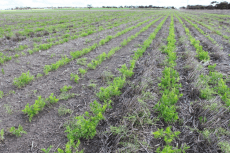PULSE crop growers in low rainfall areas of the southern cropping region – particularly the Mallee – are being advised to not give up on extracting a yield from this year’s crops.

While many pulse crops might look like they’re not going to break even this year it is important to remember that they have a surprising capacity to burst into life with some well-timed rain in early spring. Photo: Katherine Hollaway
Agriculture Victoria pulse agronomist Jason Brand said growers despondent about the lack of growing season rainfall and the performance of their pulses should wait before making the call to brown manure (spray out) their crops.
“With crops only a few inches high it might look like brown manure is all they’re good for,” said Dr Brand, who is involved in Grains Research and Development Corporation (GRDC) pulse-related project investments.
“But pulse prices are still good enough for growers to break even at relatively low yields, and most have a surprising capacity to burst into life on the back of one decent rainfall event.
“My advice to growers is don’t make the call to brown manure too early. As long as the crop is up and established, they have until at least mid-September, maybe longer, before making a decision.
“If the crop is relatively small and not using a lot of water, then a 0.5-1.0 tonnes/hectare yield is achievable. It only takes an inch or two of rainfall in spring and away they go. Lentils are very responsive to well-timed rain, chickpeas less so, but most pulses can hang on and won’t shut down until the last minute.”
Dr Brand cites 2015 as a classic example of when prices were high and yields of just 250 kilograms/ha could be profitable. “Over the long term, a yield of about 500-750 kg/ha is regularly achievable, even under dry conditions.”
He said aiming for a half-tonne yield is worth it if growers can keep their costs down. However, the challenge is in harvesting a crop that is low to the ground. In this situation, paddock preparation, such as rolling at sowing, pays off.
“Our research has focused on developing varieties and farming systems that will take the risk out of growing pulses,” Dr Brand said.
“Using modern varieties and choosing the paddock carefully can make all the difference. Stubble retention, timeliness, rolling and paddock preparation are all part of the package. Choosing a clean paddock can reduce herbicide costs.
“If the spring doesn’t go so well then brown manure can still provide value. That 20 kg/ha of nitrogen from a brown manure crop is better than nothing.”
Dr Brand encourages growers to avoid spending time on social media looking at images of more favourable pulse crops and to instead talk to their neighbours about some of the techniques they have used in the past to harvest small pulse crops. “There are a lot of skilled operators out there.”
AGRIvision Consultants general manager, Kent Wooding, said it is important to remember the reasons why pulse crops are in the rotation.
“keep in mind the additional benefits from pulses”
“While growers are always looking for and planning for a profitable crop, they need to also keep in mind the additional benefits from pulses,” Mr Wooding said. “These include the disease and weed break, the nitrogen benefits and also the opportunity to mix up herbicide groups and weed control methods.”
In more dry seasons, Mr Wooding said it is important that growers remain realistic: “There is still room for some level of optimism, but make sure you discuss your expectations with your agronomist and work out where you can afford to cut costs.
“The best way to keep costs down is by doing key things well and doing them at the right time,” said Mr Wooding.
“Experience tells us that we always need to control weeds. Procrastination comes at a high cost. Delaying the spend on weed control ends up costing more with higher rates and poorer control.
“By contrast, returns on fungicides are unlikely in a drier season, but monitor closely and be ready to act if necessary.”
Growers are advised to also monitor closely for heliothis (Helicoverpa species). “If numbers are below economic thresholds, then save your money,” Mr Wooding said. “But if the numbers are high enough to cause damage, spraying must occur.
“It can be easy to turn a half tonne crop into zero if heliothis are not controlled. But recognise that pulse crops intended for human consumption will require heliothis control if you find any level of these pests in the crop.”
Regardless of how the crop finishes, growers cannot afford to miss the opportunity to stop grass seed set, according to Mr Wooding. “Crop topping is one cost that cannot be cut because of the impact on subsequent cereal crops.”
Growers keen to learn more about diversifying into pulse crops, such as lentil and chickpea, in non-traditional areas of Victoria and South Australia can join a Pulse Check group. The groups are run by local farming systems groups and are supported by the GRDC through its investment, “Supporting expansion of high value pulses into new areas and ensuring sustained profitability of all key pulse crops in existing areas”.
The Pulse Check groups provide a unique opportunity for growers with little or no experience to learn from more experienced growers in their region and experts in the industry. The groups meet four times a year to discuss issues relating to pulse crop production, management and marketing through practical in-field learning and group discussion.
Pulse Check groups are located in SA at Keith, Cummins, Cleve, Napperby, Loxton, Mannum, Kimba and Lock, and in Victoria at Dookie, Nandaly, Werrimull and Pyramid Hill. For more information on how to contact a group in your area contact Pru Cook at BCG via 0438 923 258.
Source: GRDC



HAVE YOUR SAY